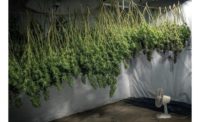In tests conducted at the University of Colorado (CU) at Boulder's College of Engineering and Applied Science, the study exposed millions of anthrax-type spores and mold spores to StrionAir's air purifying system that combines mechanical air filtration, ionization, and electrostatics. A 24-hour test period resulted in 97 percent and 99 percent inactivation of anthrax-type and mold spores, respectively, according to the study results. The kill rates observed by the study's researchers are consistent with exponential reductions of 99.9 percent and higher when spore forming bacteria and molds are exposed for longer periods, such as in a typical 24/7 HVAC field application, according to Mark Hernandez, Ph.D., P.E., the study's principal investigator and an environmental engineering professor at CU.
"When compared to a static filter, a spore kill rate above 97 percent in just 24 hours is fantastic," said Hernandez, who specializes in bioaerosol disinfection. "Spores remain captured on the filter surface and are continually subjected to electric forces. They can't reproduce and will die soon after capture."
StrionAir Inc., Louisville, Colo., donated a small-scale version of its commercial HVAC filtration equipment to the CU study. Millions of Bacillus subtilis spores, a widely used bioaerosol surrogate because it's a non-pathogenic relation to Bacillus anthraces (anthrax), and Aspergillus versicolor spores, a pathogenic surrogate for mold, were applied to the filter media and subjected to StrionAir's patented system of electric fields.
"Cells in a sporulated state have a thick protein coat and other physiological factors that make them highly resistant to heat, cold, ultraviolet (UV) radiation, desiccation, chemical disinfectants, and physical stress," said Hernandez. "Consequently they're much harder to kill than these same cells in their vegetative state. These were conservative tests because ‘garden' variety environmental bacteria, whether pathogenic or not, are likely to be less resilient to the disinfection effects of the electric fields we saw applied here. Based on this test, it's clear that this type of commercial filtration equipment will likely kill anthrax, mold, and the weaker communicable pathogens that cause diseases such as whooping cough, tuberculosis, and measles."
Hernandez said the combination of mechanical filtration, ionization, and electrostatics, such as the StrionAir system, appears to offer air purification advantages over other HVAC disinfection methods studied in past bioaerosol experiments, such as UV lights and HEPA filters. "Spores have evolved to survive in harsh environments and many are resistant to UV," said Hernandez. "UV lights don't remove or kill pathogens, they only prevent replication if the dose is high enough," he said. "HEPA filters don't actively kill microorganisms, plus the relatively high airflow resistance they create can significantly increase operational costs."
For more information, visit www.strionair.com.
Publication date: 09/05/2005





